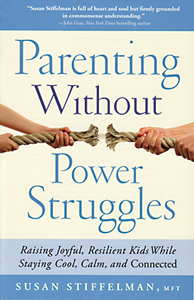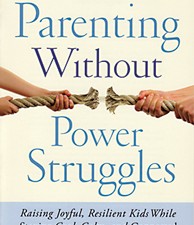
Parenting Without Power Struggles
 I wanted to blog about Parenting Without Power Struggles because I loved the idea it was pitching – “This isn’t about parents being in control; it’s about being in charge.” To set up this concept, Susan Stiffelman uses the analogy of a Captain and his ship. Stiffelman argues, while it might be fun to dine together, no passenger wants to hear the Captain running around on the deck screaming about how the boat has a leak. Therefore, she believes, parents must also remain steady and calm – regardless of their moods or behaviors – so that their children can relax, like the ship’s passengers, knowing they can rely on us, the Captain.
I wanted to blog about Parenting Without Power Struggles because I loved the idea it was pitching – “This isn’t about parents being in control; it’s about being in charge.” To set up this concept, Susan Stiffelman uses the analogy of a Captain and his ship. Stiffelman argues, while it might be fun to dine together, no passenger wants to hear the Captain running around on the deck screaming about how the boat has a leak. Therefore, she believes, parents must also remain steady and calm – regardless of their moods or behaviors – so that their children can relax, like the ship’s passengers, knowing they can rely on us, the Captain.
Building upon this great idea, Stiffelman uses different images of hands as a simple model for understanding who – if anyone – is in charge at your house.
- When the right hand is positioned about the left, the parent is in charge.
- When the hands are side by side, no one is in charge. She refers to this as ‘two lawyers’ because this is when power struggles take place.
- When the left hand is above the right, the child is in charge and “you’re issuing either threats or bribes to try to get back in charge.”
Then, Stiffelman uses numerous powerful examples and anecdotes to convey her point. “When we give our children the power to make us feel that we are or are not good parents – or good people – we’ve relegated the job of steering the ship to them, all the while hoping, threatening, and begging them to guide it in the particular way we want it to go so we get the outcome we think we need.”
Parenting Without Power Struggles maintains that children want and need to feel dependent on us. Again, Stiffelman explains, “As fun as a passenger might think it would be if the Captain were to hand the steering wheel over to him, after a moment or two he would start to feel edgy and insist that the skipper take over. As passengers, we want the sense of security that comes from knowing the Captain is confidently at the helm.”
Stiffelman’s suggestions for how to resume your position as Captain:
- Focus on loosening your need for your child to behave properly so that you can feel you’re a good parent.
- Let go of the drama and threats that simply emphasize how out of control you’ve become.
- Come alongside your child, rather than at him, so he feels you’re his ally and advocate.
Parenting Without Power Struggles believes that you must not only stay calm but also connected. As a result, Stiffelman devotes considerable attention to the child’s need to attach. “The best insurance policy parents can ‘buy’ to ensure their children will grow up to be healthy and resilient is to forge and maintain strong emotional connections.” After detailing the six stages of attachment – proximity, sameness, belonging, significance, love, and being known – Stiffelman offers numerous ideas for strengthening the parent-child relationship, without forfeiting your role as the person in charge.
In order to create an unshakable connection with your kids, parents need to recognize that “kids want and need parents who are able to receive what they have to say, whether it’s good news or bad; but first they check us out to determine whether we’re going to be able to handle what they want to tell us.” Stiffelman claims, “We often unconsciously send our kids the message that we can’t or don’t want to hear them by interrupting, advising, criticizing, and questioning them instead of listening attentively (with our lips together!).”
So I’m going to try to maintain my cool the next time we hit rough seas, in the hopes of fully inhabiting my role as Captain. Maybe, it’ll keep us all from grabbing a lifejacket and jumping overboard by the end of summer vacation.
Don’t forget to like Parenting by the Book on Facebook for updates on blog posts.
Read my other blog Befriending Forty and find out what happens when the person you thought you’d be meets the person you actually became.







This Post Has One Comment